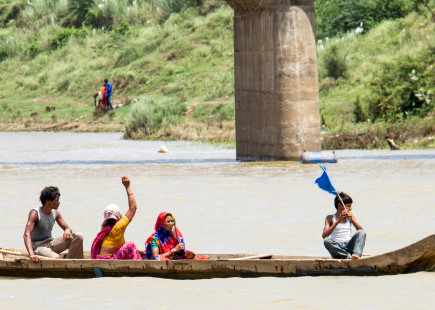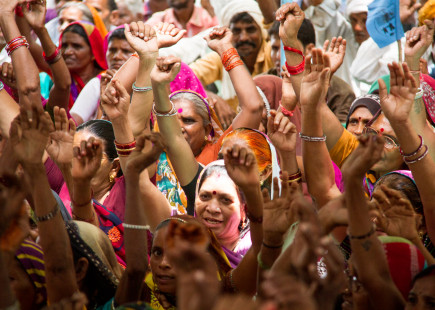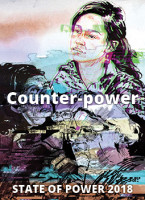We need massroots, not grassroots movements An interview with Medha Patkar
Topics
Regions
Medha Patkar of the National Peoples' Alliance shares her thoughts on how to build powerful movements based on three decades of campaigning in India against mega-dams and other forms of unsustainable and exploitative development.

Medha Patkar is an Indian activist; founder of the movement against the Sardar Sarovar dam and the National Alliance of Peoples’ Movements (NAPM) and a winner of the Right Livelihood Award (the alternative Nobel Peace Prize). She has participated in many mass struggles across India to defend human rights and resist destructive development projects that have adversely impacted indigenous and tribal communities. She has fasted (risking her life) on several occasions, been arrested and jailed, and suffered physical assault by police but has never stepped back from her campaigning.
Her efforts succeeded in ending World Bank funding for the Sardar Sarovar project and helped set up the internationally-renowned World Commission on Dams. She and the broader Narmada valley campaign continue to push for the government’s promised and legally required resettlement and compensation for those affected by the dam.
1. How did you become involved in struggles for social/environmental justice?
My father was a freedom fighter, trade union leader, so I was always accompanying him to meetings and becoming immersed in its politics. Later as I studied, I developed the same ideology of democratic socialism. Finally after graduating in social work, I started to work in the urban slums of Mumbai with Dalits and other oppressed minorities and so got further opportunities to learn, write and practice these beliefs. It was during that time, in 1985, that I was invited to visit Narmada valley and visit the many villages that would be affected by the proposed dam, the world’s second largest. My friend who had invited me wanted to take up legal actions to stop the dam, but I realized that it would also require mass resistance as laws were being broken by the government so I became involved in building a mass campaign. It took a number of years but the dams eventually became a national issue – and out of it and other struggles the National Alliance of Peoples’ Movements emerged with three core aims: to build unity amongst popular movements, to resist oppression, and to advocate for alternative development.
2. What do you consider the key ingredients for building movements that can challenge established power and build alternatives?
First and foremost, you need a broader ideological framework which you then operationalise into specific objectives, linking the micro with the macro. This doesn’t need to happen straight away - the broader goals can get clarified over time but the bigger vision is critical. At the same time you need to build up a cadre with this kind of clarity. It is not necessary that everyone who participates in a movement shares the full vision – we will all approach issues from different angles and points of view – but key activists in the movement must share a common approach. Besides ideological clarity, activists also must have a deep understanding of people, what they need; the vision and tools that will inspire people and get them emotionally involved. I don’t mean emotional in the sense of being unscientific, but an understanding that human relations matter, that we are interconnected. After all our movements depend on voluntarism, so we won’t engage people unless we properly relate and involve people of all backgrounds and all skills.

Joe Athialy
The goal is to move towards what I call a mass-roots organisation (not a grassroots organisation as grass can be plucked at any time). In other words, an organisation that has many roots, where there is local leadership, where activists are motivating and mobilising people and building a united force.
Out of this movement, comes its articulation that must happen at various fronts – inside communities but also internationally. For the Sardar Sarovar dams, we had to take on the World Bank and International Financial Institutions that were funding the project. And this required getting support from international quarters and working with international movements. At a national level, you also must constantly build alliances - sometimes just on the issue, other times on a wider ideological basis – this is critical to grow and reach more people.
We also need to work on different fronts because of our understanding of power and human rights. While engaging on human rights relates to the state and we must use the institutions of law and judiciary to challenge the state, we also believe ultimately in people power, that it is the first pillar of democracy and foundation of our work. We need constantly to show the power of people and our right to make decisions, otherwise you do not bring people along with you and you are no longer a movement.
So we constantly use legal actions and mass actions. And this isn’t just about tactics either, it is also about values and creativity. In India for example, we are fond of Satyagraha (politics of non-violence) both because it is an effective tactic but also because it demonstrates our values and vision. If we are for rights, right to life, then we cannot take away life and we must embody a politics that encourages a participatory, equitable and just decision-making process. We also must be constantly innovative in our tactics, using media, social media, communicating our ideas effectively and allowing different people to speak.
We also believe that it is important to educate and also demonstrate alternatives to oppression. So in the National Alliance of Peoples’ Movements, we run schools including real life schools and projects in areas of health, education and water management. People can’t just spend their whole time fighting, fighting, fighting; we also must demonstrate that there are alternatives.
3. In India, popular movements are facing increasing repression from the reactionary Modi Government, who also in September 2017 inaugurated the Narmada dam. How do you remain mobilised when faced with state and corporate repression?
It is an ongoing struggle. Even the courts have insisted on complete rehabilitation and compensation of those affected, yet the government has failed to deliver. The dam may be completed, but there are still 35,000 to 40,000 people – 44 villages and one township - in the submerged area. And it’s not just the inhabitants, it is all the farmers, fisherfolk, shopkeepers, labourers that will also be affected and must be fully compensated. The World Bank withdrew because it said the dam could only be finished with unacceptable means and terrible social and environmental losses. And this has come to be true. Yet we continue to struggle. In July 2017 there were 21 sites in the valley where women held fasts, stood barefoot in the water refusing to leave and stood up against the police to demand promised compensation.
It’s this collective action and spirit that gives hope and keeps people mobilised and motivated. That’s why I am optimistic, because without it as well as courage and determination you cannot carry on.
4. How do we ensure our counter-power is not co-opted or worse replicate oppressive structures of power?
It is important to be clear that peoples’ movements must always be mobilised, and organising people even when there are supportive parties challenging governments or even in power. Parties compromise because they want to win power, so movements must remain out of core power structures and play the role of the real opposition. Social movements must be a non-compromising force.
To remain true to their values, popular movements need to be rooted in their mass base and firm and committed to their goals. Being transparent is key; communicating, regularly evaluating the ways you work. Criticism is important because it is a way to clarify and rethink. It takes time, and many times we fall short, but we must try our best.
5. It’s a year since the major Women’s March in the US and internationally and five years since the horrific Nirbhaya rape case in India. Might we be at a turning point? How do we ensure womens equality is at the heart of our movements?

We know from our movements that women are a huge force and therefore social transformation is not possible without women. Women have faith in life, because they give life, because they share values and knowledge with the next generation, are closely connected to nature, and more conscious of our human connections. They undertake most of the labour in this country, whether in the countryside or slums. We also know from experience that without women, our movements wouldn’t sustain long-time actions. Whenever we have challenged the World Bank, government, police and take on non violent militant actions, women have played the key role.
In the 2017 protests against the dam, women showed massive strength against police. Women therefore must be at the forefront of challenging established power. We also must put women’s’ perspectives at the forefront. A feminist vision is key to an alternative view of development. It emphasises love and compassion, humanity rather than alienation. Women have a different relationship to resources too as they lead a less monetised life as most of the actions of care (feeding children, supporting life) are not based on cash. This encourages a different vision and also different forms of relationships with movements. You can see these values expressed in how we refer to rivers and land as mothers, and therefore resources that must be protected. By contrast, unsustainable and exploitative development is based on a system of patriarchal violence.

